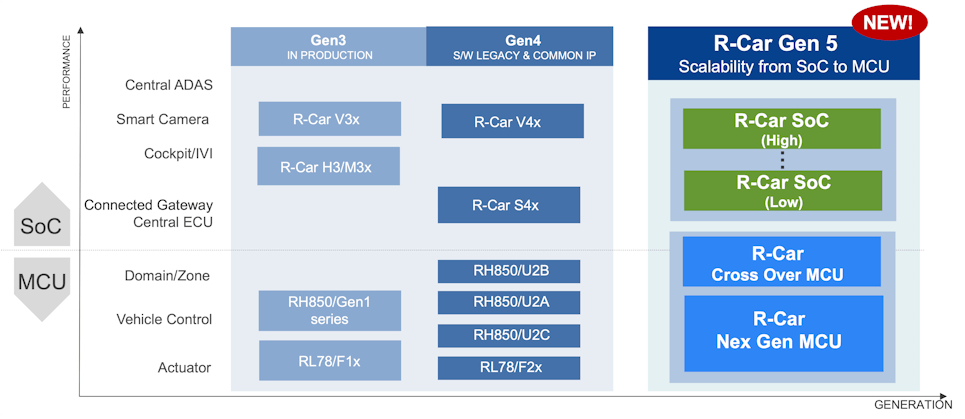As the world’s leading provider of microcontrollers (MCUs), Renesas Electronics has a significant influence on how MCUs are designed into a diversity of automotive platforms. Recently, we expanded our scope yet again with the release of a family of next-generation automotive digital products, including a roadmap for new MCUs and system-on-chip (SoC) solutions.
Renesas R-Car Generation 5 is a family that we will roll out over the next few years to address evolving design and market trends our customers see looming on the horizon. As we know, the overarching automotive electrical/electronic (E/E) architecture is undergoing a significant shift from a domain-based approach to one defined by a more centralized, zonal layout. This is necessary to achieve a series of imperatives, including simplified processing architectures, the reduction of electrical harness weight, improved fuel efficiency and the support of emerging software-defined vehicle platforms.
Today’s cars contain a significant number of MCU-based electronic control units (ECUs) that handle a variety of data and software tasks and configurations. We foresee a future where ECUs manage real-time data processing at the automotive edge via gateway systems running across a multi-Gigabit Ethernet network. At the same time, improvements in connected vehicle security will propel the adoption of cloud-based data management and over-the-air software updates that will improve the user experience and vehicle operating software.
Compared to today’s cars, the next phase of automotive design will likely trigger a reduction in the number of ECUs and a corresponding drop in bill of materials. In fact, the move to a centralized architecture could control all automotive functions using as few as four zones, which would facilitate a huge increase in real-time compute capability to handle rapidly increasing data volume.
Designing for Today, Preparing for the Future
The R-Car Gen 5 family is built around Arm-based compute engines and includes a portfolio of high-performance 64-bit SoCs, crossover 32-bit MCUs and automotive control 32-bit MCUs that enable improved flexibility, adaptability and higher levels of integration. The new family scales vertically and horizontally across all vehicle models, performance grades and applications and was designed with a heavy focus on software re-use spanning multiple vehicle products and generations.
The R-Car Gen 5 SoC also features future support for chiplets, an emerging packaging option that combines multiple products from different process generations and voltage levels. Chiplets will provide customers with additional flexibility and software re-usability while reducing development cost and time to market.
The 64-bit R-Car Gen 5 SoCs feature an open architecture that encourages OEMs to differentiate their designs. The SoCs are equipped to handle the memory-intensive compute applications required by the software-defined vehicles of tomorrow and are manufactured on leading-edge process technology that supports high-performance edge-AI compute and a strong connection to the cloud. The SoCs can be easily combined with our extensive product portfolio, which includes analog and power.

The R-Car Gen 5 family will extend beyond 64-bit SoCs to include additional Arm-based 32-bit MCUs that feature real-time, GHz-level throughput, fast boot performance and embedded non-volatile memory to manage electronic control modules for domain and zone-control applications. These expanded “crossover MCUs,” provide an option that fills the performance gap between high-end SoCs and 32-bit automotive-control MCUs.
To recap, through the introduction of the Renesas R-Car Gen 5 portfolio, we are offering customers complete scalability in a family that extends from low-end control MCUs, to moderately complex zonal-domain MCUs and more complex crossover MCUs, to a high-end range of SoC products.
Together with our customers and design partners we will significantly increase the compute capabilities needed to address the growing diversity of segments and classifications within the auto industry. This includes support for AI accelerators, the flexibility of chiplet packaging and software that enables our customers to adopt, integrate and future-proof accelerated product development across all of their system solutions.
